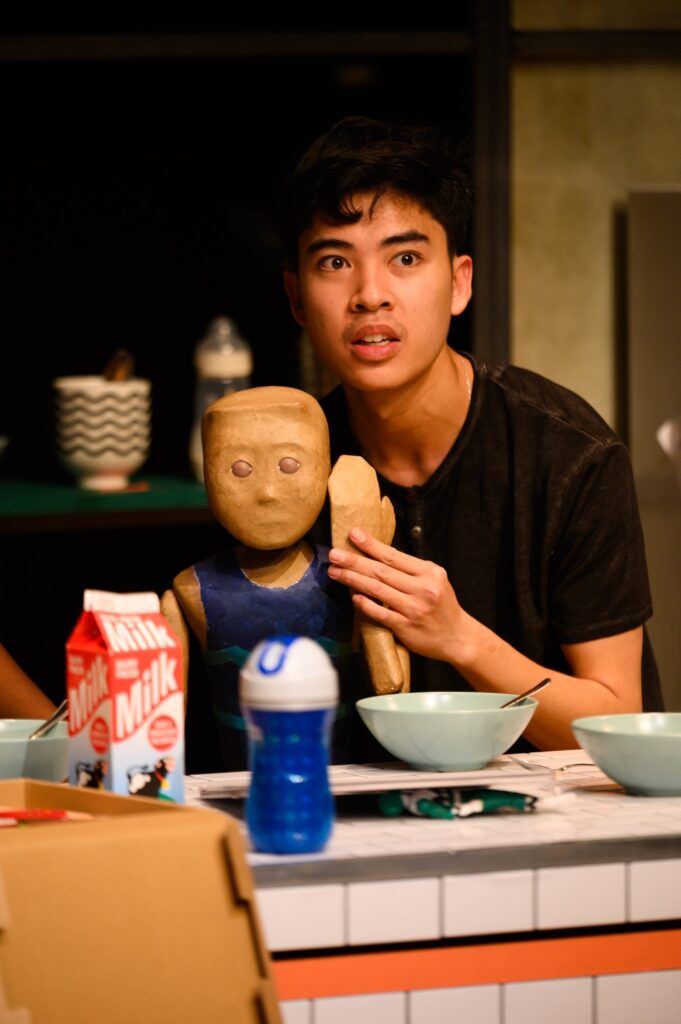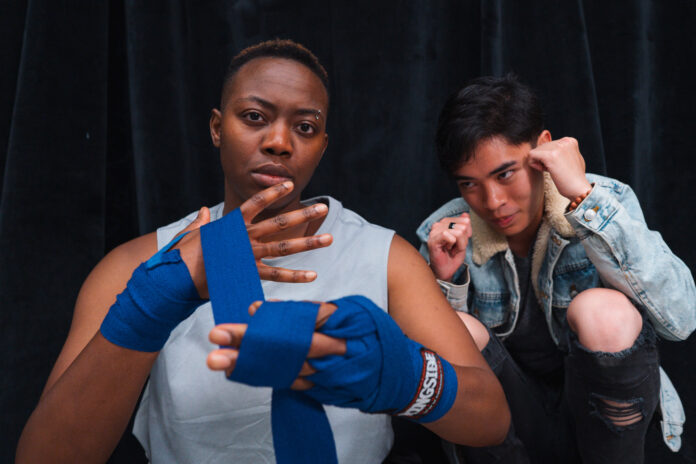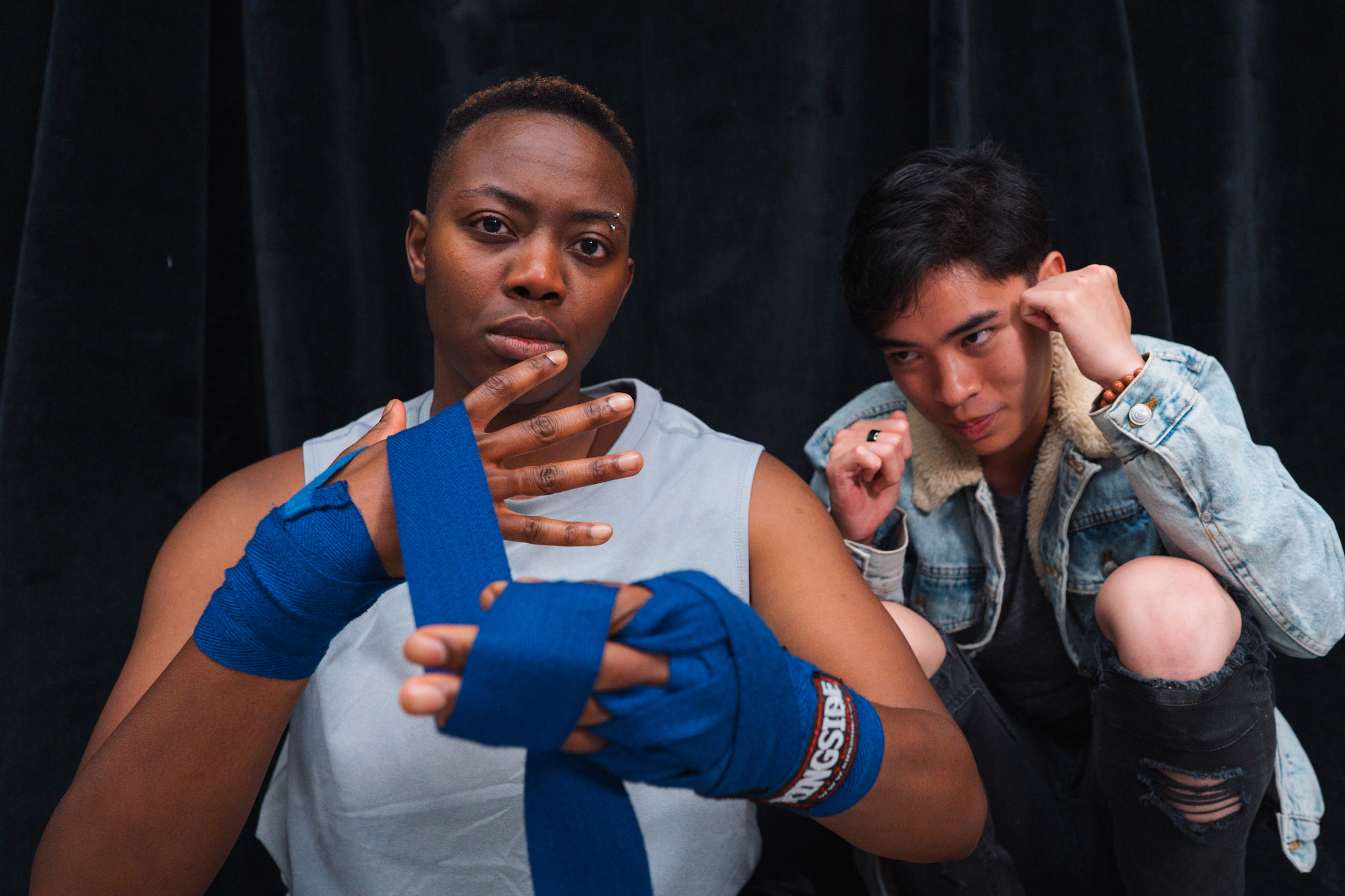In a perfect world, the ability to choose one’s own family would be on par with the acknowledgement of your biological kin. The excuse of “for the family” has been used to overlook horrific acts for almost as long family dynamics have existed. It’s why you’ll see Nicki Minaj not only defending and supporting both her pedophile brother and equally predatory husband, but publicly attacking victims of the two at every occasion.
Indeed, Elizabeth Carter’s Director’s Note for Shotgun’s production of Wolf Play (through October 1 at the Ashby Stage, Berkeley) explicitly cites recent attacks on queer parents whose only “crime” is wanting to raise a family in the same manner as their cis/het fellow citizens. Yet, we’re considered the biggest threat to the “traditional” family (which clearly couldn’t be that strong if the mere existence of homos can topple it like a house of cards).
That’s what drives this play’s would-be mother, Robin (Laura Domingo), to go to extremes in order to have a child. It starts with her getting her obnoxiously masculine brother Ryan (Caleb Cabrera) to pose as her husband during a legally murky “adoption.” The transaction, made over the Internet, has Arizona dad Peter (Sam Bertken, in a moustache that can only be described as “Flanders-core”) delivering a young Korean boy, “Peter, Jr.” (a wooden marionette voiced and operated by Mikee Loria) to Robin and her significant other.
Peter and his unseen wife Katie adopted the kid when they were unable to conceive on their own. Now that they have conceived, they’re dumping the Korean kid as if he were a re-gifted birthday present. God bless America! Of course, a steadfast conservative like Peter would never have agreed to the exchange if he’d known that Robin is actually—prepare to clutch your pearls—part of one of those queer couples!
Her real partner is Ash (Gabby “G” Momah, who uses they/them, but the character’s pronouns are unclear, though possibly the same), an amateur boxer who, under Ryan’s training, is on the cusp of going pro via an upcoming co-ed match. It clearly wasn’t Ash’s idea to have a kid and it’s clearly a distraction ahead of the match. Funny thing is, Ash is both the only one to whom the kid will speak—and the only one who sees the kid how he sees himself: as a wolf (personified by Loria in direct-to-audience address).
Normally, that would be the sign of a happy ending. Unfortunately, everyone begins rethinking their choices: Robin wondering if she was actually prepared for the responsibility; Ryan sharing his unsolicited (and unwelcome) “advice” on how a man should be raised; Peter wondering if maybe he didn’t know how good he had it with the adopted kid.
Part of me wishes that they’d just hired a child actor and that Loria’s narration was pure voiceover. That’s not at all a knock against Loria—he’s a vital part of Carter’s fine ensemble (of which Killing My Lobster veterans Momah and Domingo shine brightest in the dramatic roles)—but the use of the marionette seems to work better conceptually than in practice. Mind you, its use throughout the whole play is necessary for an emotional ending involving just it and Domingo (herself a parent in real life). I won’t spoil it, but it’s a painful and tender moment that taking place after a great many trying events, as Robin attempts, with little success, to truly see the kid for who he really is, in more ways than one.

The rest of the ending seems rushed, which is saying something about a two-hour show with no intermission (a trend I’ve come to despise). The rest of Hansol Jung’s play works as a blending of Korean mythology, a de-mythologizing of “American exceptionalism,” a screed against toxic masculinity, and a simple tale about how queer parents aren’t inherently better or worse than their non-queer counterparts. The play’s boxing metaphor is pretty heavy-handed, but it leads to some creatively-staged pugilism by Momah (overseen by Emmanual Blackwell).
It was also a relief to attend the first masked matinee for the show, Shotgun’s first since this summer. During the intermission for that show, AD Patrick Dooley told me that the Ashby’s HVAC system would have an overhaul by the time this show went up. Sure enough, I’m pleasantly surprised to report that during this non-intermission, two-hour show, my Aranet4’s CO² readings stayed pretty low. In fact, I never saw the readings go any higher than 971ppm, and this was a pretty packed house!
At its core, Wolf Play is a story about making your enemies rather than finding them by happenstance. Sure, everyone tends to have preconceived notions about others, but there’s a difference between snarking on someone’s fashion choices than there is of considering them less than human for superficial reasons. Some of the show’s choices are odd, but that happens when one tries to tell a familiar story in a unique way. To the credit of Carter and her collaborators, they pick one that steadily holds attention all the way through.
WOLF PLAY runs through October 1 at the Ashby Stage, Berkeley. Tickets and further info here.







